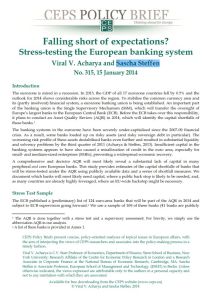
Read or listen offline
Recommendation
In 2009, the Federal Reserve conducted stress tests on US banks, which helped restore confidence in the banking system in the wake of the financial crisis. Subsequent stress tests in Europe have been decidedly less reassuring. In 2010, authorities declared Ireland’s banks sound shortly before they received bailouts, and, just three months after passing a 2011 stress test with flying colors, Dexia imploded, requiring a massive bailout from France and Belgium. The 2014 stress tests, the first since 2011, will be an opportunity for the European Central Bank to gain some credibility. getAbstract considers this statistics-laden but thought-provoking analysis of the major European banks’ capital positions a helpful aid in assessing results of the upcoming tests.
Take-Aways
About the Authors
Viral V. Acharya is an economics professor at New York University’s Stern School of Business. Sascha Steffen is an associate professor at the European School of Management and Technology.

















Comment on this summary or Diskussion beginnen